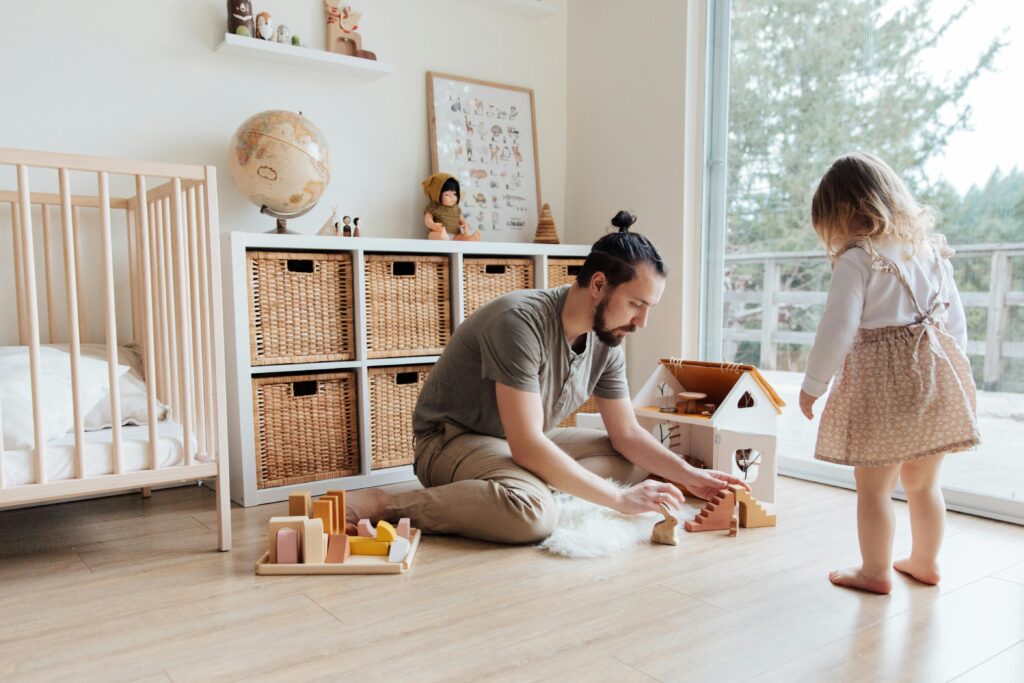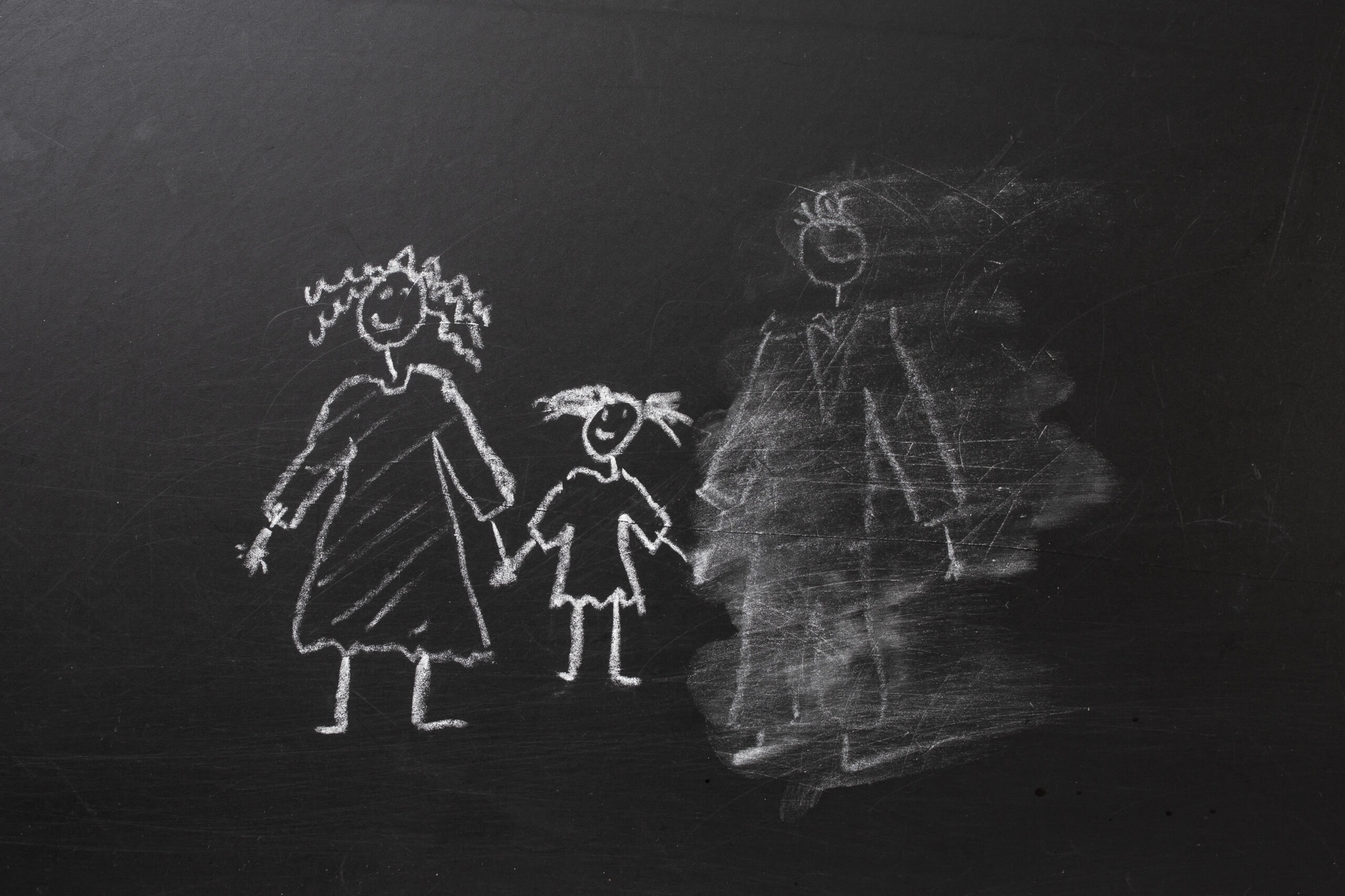She has a husband. There’s a ring on her finger, a shared mortgage, family photos on the mantle. On paper, she is not a single mom. But in practice? She is.
She works a full day at the office, then comes home to work a full night shift at home. She manages the kids’ appointments, the homework, the dinners, the never-ending piles of laundry. She remembers birthdays, orders the new soccer cleats, signs the field trip forms, orders yearbooks and school pictures, and registers the kids for summer camps. And while she’s juggling all of this, her husband is… golfing. Or watching football. Or training for a marathon. Or hanging out with friends or away on frequent work trips, as if he never became a father. And the weekends are even harder – up at the crack of dawn, down past eleven, trying to keep up with the sports, the volunteering, the house upkeep, the dinners, the holiday prep. Alone. Always alone.
She is a Married Single Mom—married in legal terms, but carrying the load of two parents on her shoulders.
A Day In Her Life
She wakes up early to pack lunches, wake up the kids and get them to the bus stop, before heading into her leadership meeting at work. There, she’s the boss: confident, respected, a problem-solver. People admire her strength and her ability to make hard calls.
At 5:00 p.m., she leaves work and shifts into her second job: pick up the kids, stop for groceries, cook dinner, help with math homework, handle bath time, referee sibling fights, fold the laundry, respond to emails for school, finish unfinished work when kids go to bed. By 11:00 p.m., she’s mentally and physically spent.
Her husband? He’ll stroll in from beers after work, relaxed, refreshed, and ready to “unwind.”
Mini Stories of Married Single Moms
Melissa, the executive. At work, Melissa manages a team of 40 people. She’s decisive, persuasive, and strategic. But at home, her husband “doesn’t do mornings.” So she gets three kids up, dressed, fed, and out the door before her first Teams call. By the time she arrives at the office, she’s already exhausted. She laughs with her coworkers about “the chaos at home,” but inside, she feels hollow.
Tanya, the nurse. Tanya works twelve-hour shifts, then comes home to a husband who insists he “needs to decompress” from his desk job before engaging with the kids. So she makes dinner, washes uniforms, and helps her daughter with a science project until midnight. Her patients call her an angel. Her daughter calls her “Mommy, can you help me?” Her husband calls from the couch: “What’s for dinner?”
Rachel, the stay-at-home mom. People think Rachel has it easier because she doesn’t “work.” But in reality, she works from sunrise to midnight, cleaning, chauffeuring, cooking, scheduling, soothing, teaching. Her husband brags to friends that he “provides,” but Rachel wonders what exactly she’s providing her kids—an exhausted mother and a father who acts like a guest in his own home. She also wonders what her life would be like were she to walk away. Where would she live, what work would she find? How much child support and alimony would she get? Would he make it as difficult as can be? What would be left of her after the battle is over?

Why Does She Tolerate This?
The answer is layered.
- For the kids. Many women convince themselves it’s better for the kids to grow up in a two-parent household, even if one parent is absent in every meaningful way.
- For peace. Some women decide it’s easier to do everything themselves than to nag, fight, or beg their husbands for help.
- For appearances. Society still praises the image of the intact family. Friends flock to houses where both parents exist. She doesn’t want to admit, even to herself, that she’s married but lonely.
- For hope. Maybe one day he’ll change. Maybe one day he’ll “step up.”
But the cost is high. Kids may see stability on the surface, but they also see their mother’s exhaustion. They notice her self-esteem shrink. They internalize the dynamic: Dad’s time is his own; Mom is the default servant. That silent lesson shapes what sons expect and what daughters accept.


The Psychology of Burnout
Here’s what’s happening under the surface:
- The competence trap. Psychologists note that women who prove they can “handle it” often get handed even more. At work, this results in promotions. At home, it results in overload.
- Chronic stress response. Every time she juggles six tasks at once, her body floods with cortisol. Over time, this constant stress rewires her brain and nervous system to stay in “alert” mode, even when she lies down at night.
- The resentment loop. Research shows that when one partner consistently does more emotional and household labor, the imbalance fuels resentment. Ironically, the more she does, the less her partner feels responsible—and the cycle deepens.
- Modeling to children. Kids learn by observation. Boys learn that fatherhood is optional; girls learn that self-sacrifice is expected. The cycle repeats into the next generation.
So when she collapses at night after “getting everything done” but feels restless and angry instead of proud, there’s nothing wrong with her. It’s her body screaming that the race is unsustainable, that her effort is invisible, that her labor is taken for granted.
Strong at Work, Small at Home
It’s a paradox: so many of these Married Single Moms are powerhouses at work. They manage teams, budgets, and projects with confidence. They are trusted leaders.
But at home, they turn into lonely lionesses. They shoulder everything quietly, or they become doormats who absorb the imbalance. Why?
Because at work, competence is rewarded. At home, competence is exploited. And she doesn’t talk about it. Not to friends, not to family, sometimes not even to herself. Shame keeps her quiet. If she admits out loud that she’s married but functionally parenting alone, what does that say about her marriage? What does that say about her worth? Her self-esteem? Her leadership? Her judgement? Her courage? Her sanity?
The Cost of Silence
The silence protects no one. It keeps women stuck in cycles of overwork and loneliness. It allows men to coast through family life as if it’s optional. And it teaches the next generation that this is normal—when it is anything but.
Men know exactly what they are doing. They are stealing time from their wives or girlfriends so they themselves have more leisure time, more career building time, more time in general while the woman does the adulting for two. It costs her everything. Her ability to be physically fit, to be beautiful, to progress her career, to strengthen her finances, to pursue her spirituality, to be a calm rested mother to her children. He steals all of this. Knowingly. Purposefully. With a great sense of entitlement.
And when he says, “Take the weekend off. Go somewhere with your friends. You should build some friendships, you know?” It’s an insult. When does she have the time to build and sustain the friendships? And she knows full well if she were to leave for the weekend, she would return to a messy house, kids who have not had proper meals or outside time or anyone to police their homework. The stress is even higher. And he does it intentionally. As punishment that propagates the world built by men for men, built on the insurmountable, unappreciated and unpaid labor of women.
What Society Must Say
We need to start naming this dynamic for what it is. Abuse. Exploitation of women, their time and their labor. Treating mothers like they are less than humans. We need to make it as societally unacceptable as smoking next to a baby or beating a child as punishment.
It is not acceptable for men to treat fatherhood as optional while their wives drown in responsibility. It is not acceptable for capable, brilliant women to shrink themselves at home, to become a permanent servant for decades. It is not acceptable for children to grow up watching their mothers give everything while their fathers give the bare minimum.
Married Single Moms are not weak. They are warriors. But they shouldn’t have to fight this battle at all.
And until we stop excusing men from full participation in family life, we will keep producing generations of women who feel like lions at work but ghosts in their own homes.


Reader Reflection
- Do you recognize yourself in these stories?
- How much of the household and parenting load do you silently carry?
- What message is your family absorbing about gender roles from the way things are split in your home?
- If you could hand off just two to three responsibilities with consistency—meals, scheduling, sports logistics, bill paying—what would it be?
- And most importantly: what would it look like for you to stop carrying this burden alone?
- If you are a Single Married Mom, why do you stay? Is it worth it?
